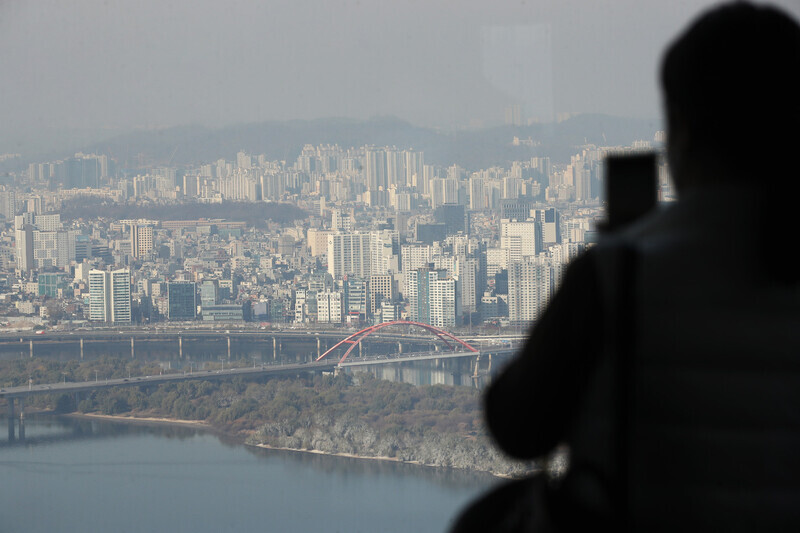hankyoreh
Links to other country sites 다른 나라 사이트 링크
Bank of Korea warns of volatility from 16 years of mounting household debt ratio

The Bank of Korea warned that because household debt has been growing faster than the Korean economy for so long, the country may end up seeing housing prices and debt fall at the same time. If these two events were to coincide, the bank found, it would prolong the time needed for an economic recovery.
The nation’s central bank published these findings on Monday in an issue note.
Drawing upon data from the Bank for International Settlements, the report calculated the average period over which the ratio of household debt to economy size (nominal GDP) increased and decreased since 2000 in 42 major countries, including the US, Japan, Germany and France.
This analysis found that the household debt-to-GDP ratio decreased in 40% of the period studied, or 1,374 of 3,435 quarters between the first quarter of 2000 and the first quarter of 2021. (Data was missing for some countries during that period.) That means that the debt-to-GDP ratio decreased around eight years since 2000 in 42 countries.
The researchers also found a correlation between the period when the household debt-to-GDP ratio increases and when it decreases. A decrease in the debt-to-GDP ratio — in other words, deleveraging — appeared after the debt-to-GDP ratio had continued to increase for 3-4 years. Deleveraging, once it begins, continues for an average of 2-3 years, they found.
Significantly, housing prices were observed to fall around 4% per quarter in around 312 (23%) of the 1,374 quarters when deleveraging occurred. The countries under consideration in which deleveraging and housing prices fell together for the longest period were Spain (Q2 2010-Q1 2015), which was hammered by the global financial crisis and the European sovereign debt crisis back to back, and Japan (Q1 2000-Q2 2004), which was trapped in long-term low growth.
Korea’s experience in the 2000s and 2010s has been quite different from those trends. The household debt-to-GDP ratio began to fall in the fourth quarter of 2002 amid the credit card crisis that took off the following year. The third quarter of 2004 was the first of three consecutive quarters in which Korea underwent deleveraging that was accompanied by falling housing prices. Since then, Korea hasn’t faced deleveraging even once.
Such trends are difficult to find among advanced economies, except for France and Sweden. “Korean household leverage (debt) has accumulated for 16 years. That’s a very irregular phenomenon,” the report said.
The report’s authors think these peculiar trends represent a latent risk for the Korean economy as a whole. Such concerns have been exacerbated by the fact that the public sector debt ratio, which had been gradually increasing, has shot up during the COVID-19 pandemic.
“During past financial crises, deleveraging in the private sector has been absorbed by the public sector, which has minimized the economic shock resulting from changing leverage. There are fewer fiscal options because leverage has increased simultaneously in the private and public sectors during the COVID-19 crisis. If deleveraging occurs in the private sector in such a situation, the economic shock could be greater and the economy could take longer to recover,” the report said.
When the researchers singled out seven countries without key currencies, including Korea, it found that it took five years or longer for an economy to recover from deleveraging when the ratios of debt in the public and private sectors (including corporations) radically departed from the long-term average.
By Jun Seul-gi, staff reporter
Please direct questions or comments to [english@hani.co.kr]

Editorial・opinion
![[Column] Season 2 of special prosecutor probe may be coming to Korea soon [Column] Season 2 of special prosecutor probe may be coming to Korea soon](https://flexible.img.hani.co.kr/flexible/normal/500/300/imgdb/original/2024/0426/3317141030699447.jpg) [Column] Season 2 of special prosecutor probe may be coming to Korea soon
[Column] Season 2 of special prosecutor probe may be coming to Korea soon![[Column] Park Geun-hye déjà vu in Yoon Suk-yeol [Column] Park Geun-hye déjà vu in Yoon Suk-yeol](https://flexible.img.hani.co.kr/flexible/normal/500/300/imgdb/original/2024/0424/651713945113788.jpg) [Column] Park Geun-hye déjà vu in Yoon Suk-yeol
[Column] Park Geun-hye déjà vu in Yoon Suk-yeol- [Editorial] New weight of N. Korea’s nuclear threats makes dialogue all the more urgent
- [Guest essay] The real reason Korea’s new right wants to dub Rhee a founding father
- [Column] ‘Choson’: Is it time we start referring to N. Korea in its own terms?
- [Editorial] Japan’s rewriting of history with Korea has gone too far
- [Column] The president’s questionable capacity for dialogue
- [Column] Are chaebol firms just pizza pies for families to divvy up as they please?
- [Column] Has Korea, too, crossed the Rubicon on China?
- [Correspondent’s column] In Japan’s alliance with US, echoes of its past alliances with UK
Most viewed articles
- 1Is Japan about to snatch control of Line messenger from Korea’s Naver?
- 2‘We must say no’: Seoul defense chief on Korean, USFK involvement in hypothetical Taiwan crisis
- 3[News analysis] Using lure of fame, K-entertainment agency bigwigs sexually prey on young trainees
- 4[Column] Park Geun-hye déjà vu in Yoon Suk-yeol
- 5Will NewJeans end up collateral damage in internal feud at K-pop juggernaut Hybe?
- 6Up-and-coming Indonesian group StarBe spills what it learned during K-pop training in Seoul
- 7[Column] Season 2 of special prosecutor probe may be coming to Korea soon
- 8Korea’s 1.3% growth in Q1 signals ‘textbook’ return to growth, says government
- 9Report reveals toxic pollution at numerous USFK bases
- 10[Editorial] Statue should not be central concern of comfort women issue